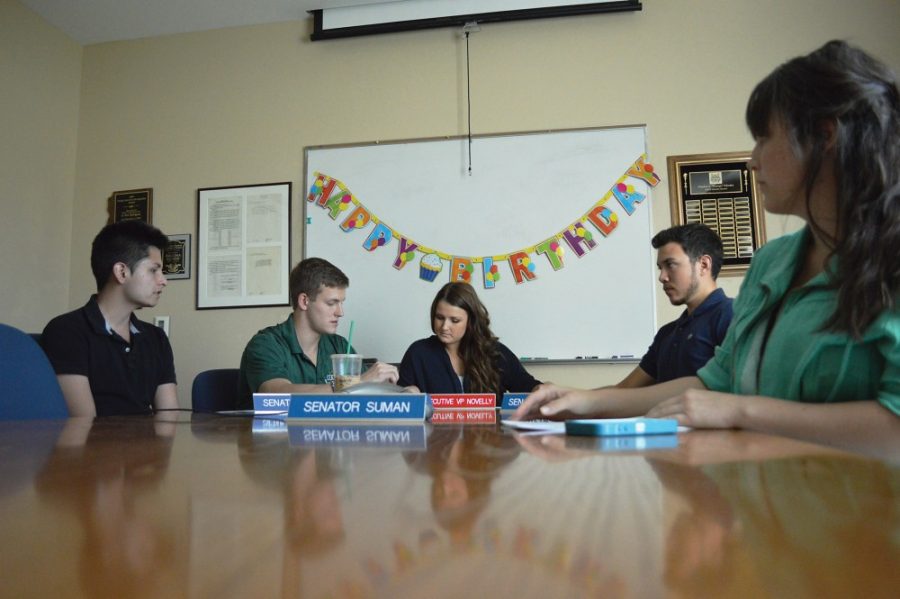ASUA will vote this fall whether to include a student-run, statewide lobbying group in its bylaws, after the group made changes to the number of directors who represent them from each of the three universities.
In past years, each university’s undergraduate student body president chose three directors to sit on the Arizona Students’ Association board, and the graduate president would choose one director. Both undergraduate and graduate presidents would also sit on the board.
Beginning this academic year, there will be four directors instead of six.
While an undergraduate student body president and the graduate student body president are still invited to be ASA directors, the other two directors, one undergraduate student and one graduate student, will be chosen by former ASA directors instead of being appointed by the student government presidents.
These changes were made after the newly elected Associated Students of the University of Arizona president, Morgan Abraham, had already hired three ASA directors for the 2013-14 academic year. As a result of the changes, ASUA has created three new positions for the newly hired directors to fill.
With their stipend already budgeted, Abraham said the three directors will still be lobbying and reaching out to educate students about government issues affecting students, but they will report back to ASUA rather than ASA. One of the three directors will focus on maintaining a relationship with the other two state universities so the three can work together to reach out and represent students.
“The people that we hired are incredibly intelligent,” Abraham said. “And I still think they’d be incredibly effective lobbying … making relationships, talking to people and educating students.”
Abraham also said that he is going to push for having an internal policy department, regardless of whether ASUA continues working with ASA.
Last week, the Associated Students of Northern Arizona University’s senate voted via email to separate themselves from ASA, according to Makenzie Mastrud, ASNAU president.
ASNAU also created new internal positions, as Student State Affair Directors, for the three students who were going to be ASA directors.
“I think that internally (ASA) had a lot of problems that they needed to fix and I think those problems were really holding back the students,” Mastrud said. “And now that we aren’t affiliated with them, I think we will be able to work in the betterment of the students.”
ASNAU will be implementing a political-based task force this year to get students involved in lobbying and campaigning, and to educate students about the Arizona Board of Regents as well as on issues and policies that affect students.
ASU’s Undergraduate Student Government also removed themselves from ASA in fall 2012 after the organization donated $100,000 to the Vote Yes on Prop. 204 campaign using a $2-per-student fee collected by the universities for the organization. This donation caused controversy and ultimately led to a state bill, HB 2169, that would prevent Arizona universities from collecting student fees for groups not recognized by the universities, such as ASA.
Currently, ASUA is the only undergraduate student government still affiliated with ASA.
The recent changes in director appointments were a way of restructuring ASA for the future, said Jason Kordosky, chair of ASA and graduate student body president at NAU. ASA will continue to represent students by campaigning on issues at the Legislature and will continue to seek student representatives despite undergraduate student government’s removal from the organization, Kordosky added.
“It’s not going to limit our capacity, it’s not going to limit our mission or what we do,” Kordosky said. “There’s a lot of other groups besides student governments out there … it really provides us with a lot of opportunities to move forward … to reach out to other groups.”
In previous years, directors appointed by ASUA receieved a stipend for their work, but because ASA’s former directors chose a different UA undergraduate director than those Abraham had appointed, ASUA will not be paying this year’s undergraduate ASA director.
However, the graduate ASA director from the UA is part of the Graduate and Professional Student Council and will receive a stipend from GPSC this year. Kordosky said the organization will look into the possibility of paying its directors now that they aren’t affiliated with two of the three undergraduate student governments.
“My preference is that we provide something for all our directors,” Kordosky said. “For all the work that’s involved being in ASA I think it’s important to compensate people for their time. But I mean I think it’s really up to the full board to ask how that goes.”
HB 2169 was passed in April which means ASA will also no longer receive student fees. With $390,000 in reserves, ASA’s board of directors is discussing ways to collect money in order to stay afloat, according to Kordosky. ASA held its first meeting last Saturday where they discussed new sources of income, according to Abraham.
“I’m optimistic of ASA’s future,” Abraham said. “But I’m going to urge my senate to focus on what’s best for the U of A.”









